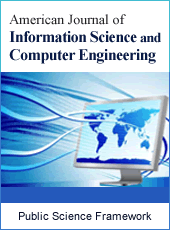American Journal of Information Science and Computer Engineering
Articles Information
American Journal of Information Science and Computer Engineering, Vol.5, No.2, Jun. 2019, Pub. Date: Jun. 11, 2019
Technology Driven Challenges Information Professionals and Academic Librarians Face: Internet of Things (IoT) as a Solution
Pages: 72-76 Views: 2029 Downloads: 868
[01]
Renee Pistone, School of Information Studies, St. John’s University, Queens, New York, USA.
Technological advancements continue to inspire librarians to transform the services they provide in order to stay relevant in the digital age. Contemporary libraries strive to deliver services to all community members because literacy is open to all members of society. In the past, literacy has been restricted to those members of society who could afford an education. Modernly, great strides continue to be made in order to provide access to books and to teach reading skills and language skills. The modern library is at the center of these changes. The library serves its community using tools to help community members with job searches and to stay current on industry trends by reading books and magazines. Resources continue to be limited as budgets continue to shrink across the nation at public and private universities. Small and large towns also face fiscal issues that impact community libraries. Academic library and other information science professionals’ ability to deliver service has been impacted by changes in technology called the Internet of Things (hereinafter, IoT). Academic library professionals share a common goal to adopt IoT technologies including internet, sensors, and RFID to innovate services. It is worth examining what the implementation of IoT is polled to be now, what initiatives and programs are offered and what success they have shown.
IoT, Magic Mirror, IoT Use, IoT Benefits, Radio Frequency Identification Technology
[01]
Bansal, A., Arora, D., & Suri, A. (2018). Internet of things: Beginning of new era for libraries. Library Philosophy and Practice, 1, 1-6.
[02]
Tarique, M., Rani, P., & Vandana, C. (2017). Implementation of RFID in library management system based on internet of things. International Journal of Scientific Research in Computer Science, Engineering and Information Technology, 2 (3), 315-321.
[03]
Kaladhar, A., & Rao, K. (2017). Internet of things: A route to smart libraries. Journal of Advancements in Library Science, 4 (1), 29-34.
[04]
Nag, A., & Nikam, K. (2016). Internet of things applications in academic libraries. International Journal of Information Technology and Library Science, 5 (1), 1-7.
[05]
Nie, W. (2017). The application of internet of things in the university library. Advances in Computer Science Research, 59, 24-27.
[06]
Najafi, N., Asemi, A., Sohrabi, M., & Shabani, A. (2019). The scientific information exchange general model at digital library context: Internet of things. Library Philosophy and Practice, 1, 21-25.
[07]
Pujar, S., & Satyanarayana, K. (2015). Internet of things and libraries. Annals of Library and Information Studies, 62, 186-190.
[08]
Massis, B. (2015). What’s new in libraries: The internet of things and its impact on the library. New Literary World, 117 (3), 289-292.
[09]
Singh, K., & Nikandia, P. (2017). Role of mobile technology and their application in library services in digital era. Journal of Library & Information Science 7 (1), 157-165.
[10]
Wada, I. (2018). Cloud computing implementation in libraries: A synergy for library services optimization. International Journal of Library and Information Science, 10 (2), 17-27.
[11]
Leu, D., Kinzer, C., Coiro, J., Castek, J, & Henry, L. (2017). New Literacies: A duel-level theory of the changing nature of literacy, instruction, and assessment. Journal of Education 197 (2), 1-19.
[12]
Wiesche, M., Jurisch, M., Yetton, P., & Kromar, H. (2017). Grounded theory methodology in information systems research. Management Information Systems Quarterly 41 (3), 685- 701.
[13]
Shehata, A., Ellis, D., Foster, A. (2015). Scholarly communication trends in the digital age: Informal and dissemination, a grounded theory approach. Electronic Library Journal, 33 (6), 1150-1162.
[14]
Walsh, I. (2014). Using quantitative data in mixed-design grounded theory studies: An enhanced path to formal grounded theory in information systems. European Journal of Information Systems, 33, 1-27.
[15]
Vassilakaki, E., & Johnson, F. (2015). The use of grounded theory in identifying the user experience in search. Library and Information Science Research, 37 (1), 77-87.

ISSN Print: 2381-7488
ISSN Online: 2381-7496
Current Issue:
Vol. 7, Issue 3, September Submit a Manuscript Join Editorial Board Join Reviewer Team
ISSN Online: 2381-7496
Current Issue:
Vol. 7, Issue 3, September Submit a Manuscript Join Editorial Board Join Reviewer Team
| About This Journal |
| All Issues |
| Open Access |
| Indexing |
| Payment Information |
| Author Guidelines |
| Review Process |
| Publication Ethics |
| Editorial Board |
| Peer Reviewers |


